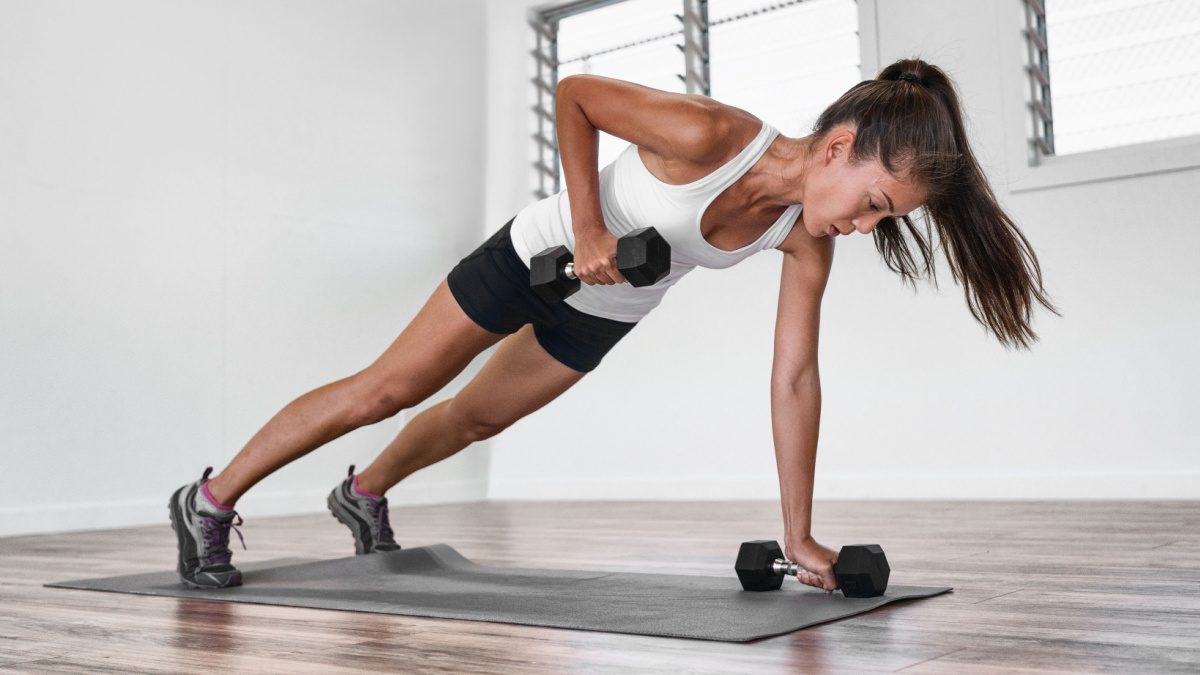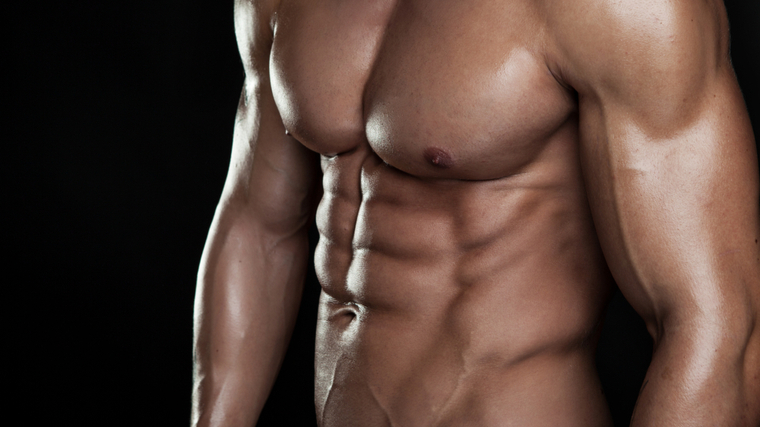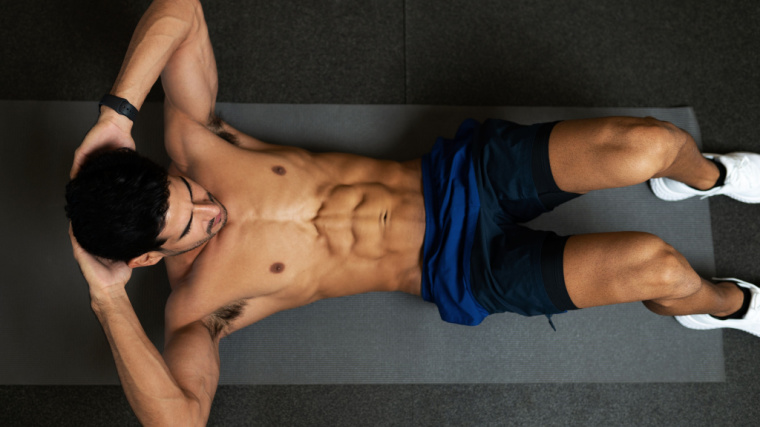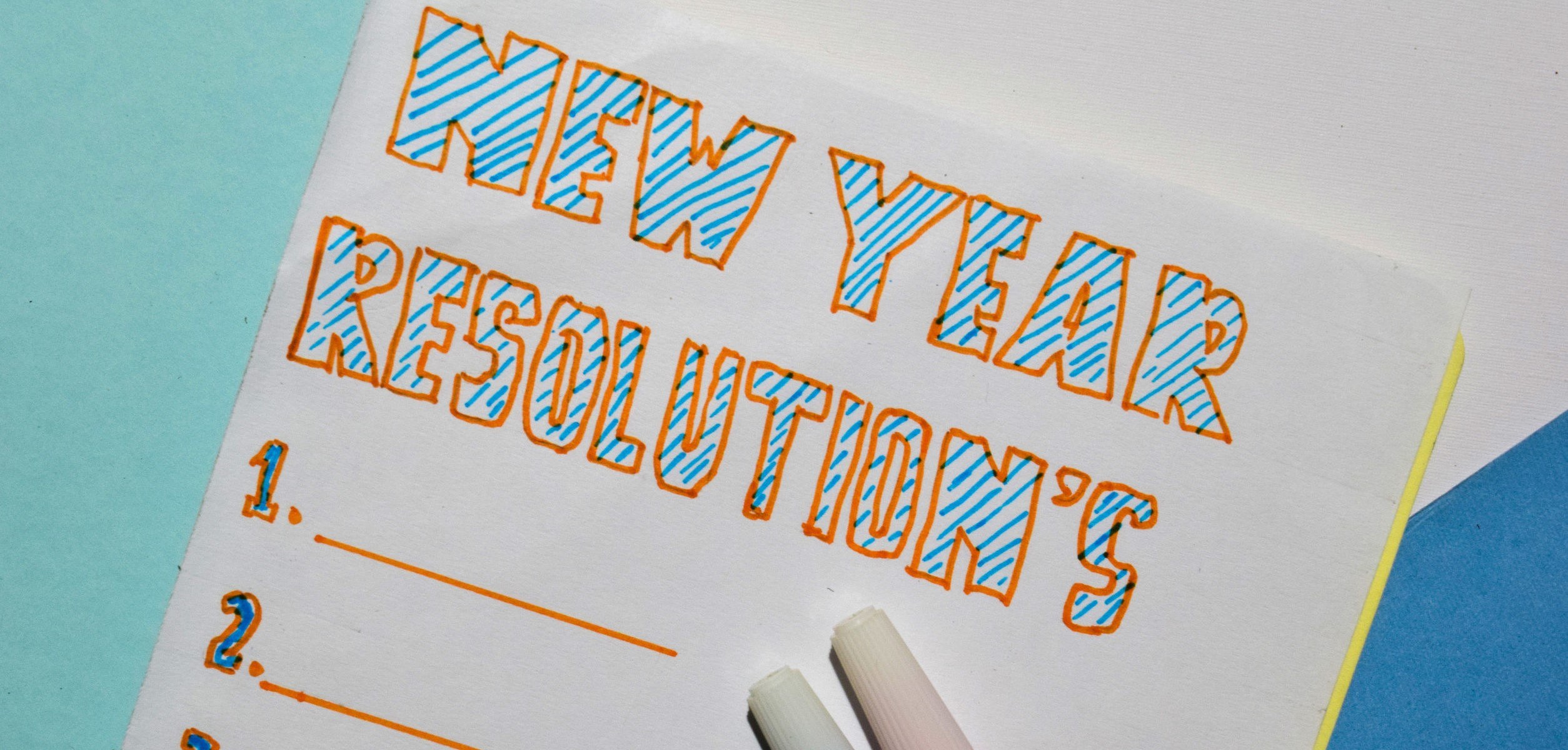
Ab training is not only about aesthetics and making your abs look better. Yes, these workouts will check both of those boxes, but these specialized training plans can also help you understand that your abdominal muscles are highly functional, not just for show.

Once you start training them effectively, you can end up looking better, moving better, and feeling better. These workouts may look simple, but don’t be fooled because simple does not mean easy. Get ready to build a midsection that will help you crush any workout and, if needed, anyone.
Best Dumbbell Ab Workouts
Best Dumbbell Ab Workout for Strength
If you want to get stronger, training your abs is extremely underrated. You might be more focused on heavy squats and deadlifts. While these types of big movements do require abdominal engagement, you’re limited to the amount of direct exposure to properly train those muscles with progressive overload through longer ranges of motion. (1)
To really build serious core and total-body strength, expose your abdominal muscles to a variety of challenges and stimuli when both creating and resisting movement. During compound movements, that happens through the sagittal plane when you are resisting flexion and extension (abdominal bending and straightening) using isometric contractions to create tension.
The Core Strength Workout
This workout exposes your abdominal muscles to unique stresses that aren’t already addressed in your training program. It will challenge your abs to resist and redirect force, as well as overcome direct resistance in different directions. Perform this workout two to three times per week at the end of your other sessions.
Dumbbell Plank Pull-Through
- How to Do it: Place one dumbbell on the ground and position yourself at arm’s length to the side. Begin with your hands, knees, and toes on the floor. Set shoulders directly over your wrists and your knees directly under your hips. Keep your arms straight and actively push your hands into the ground while reaching your shoulders down to engage your serratus anterior. With the hand farthest from the weight, reach across your body and then drag the dumbbell across the floor underneath you. Take three to four seconds to move the weight, which should allow you to feel your abdominal muscles working. Continue dragging the weight until your arm is fully extended. Don’t allow your body to tilt or rotate. Switch hands and return the weight to the starting position.
- Sets and Reps: 3 x 16 total reps, alternating sides each rep for 8 reps per side/per set.
- Rest time: 60 seconds between sets.
Dumbbell Sit-Up
- How to Do it: Lie on the ground and hold one dumbbell by the ends, horizontally, under your chin and resting on your chest. The key is to keep the weight touching your body, which will make the initial part of the sit-up much harder (in a beneficial way). It also ensures that your abdominals, not your hip flexors, are performing the movement. (2) Dig your heels into the floor and pull them back statically to engage your hamstrings. Curl your torso toward your knees. When you successfully get to the top, slowly lower yourself down back to the start position. Keep your head and shoulders away from the floor so you don’t fully relax in between each rep.
- Sets and Reps: 3 x 10
- Rest time: 60 seconds between sets.
Dumbbell Side Bend
- How to Do it: Stand up straight with one dumbbell in the suitcase position (in one hand, at hip-level as if carrying a suitcase). Without rotating or twisting, lean your upper body down towards the weight and feel a stretch along the other side of your body. Maintain a stable base and don’t shift your entire weight over to the side. Your individual range of motion will be different based on overall mobility and strength. When you’ve reached the maximum comfortable stretch, pull yourself back to an upright position using the stretch your obliques and core. Avoid “over-correcting” or leaning too far over to the opposite side. Perform all reps on one side before switching hands.
- Sets and Reps: 3 x 10 reps per side.
- Rest time: No rest between sides. 60 seconds between sets.
Best Dumbbell Ab Workout for Muscle Gain
Many people think abs are closely associated with fat loss, and that’s a fair connection. However, the abdominal muscles are, in fact, muscles just like any other. They can be trained for growth which, just like your biceps, calves, or any other muscle group, can help them stand out and look even better.
How to Build More Muscular Abs
These three moves will make your abs look and feel like they have been carved out of rich mahogany. To really build muscle, challenge the abdominals with both more load and more volume than they’re used to. Perform this workout three to four times per week.
Dumbbell Double Crunch
- How to Do it: Lie on the ground with your legs bent and your heels elevated on a bench, box, or stability ball. Hold a dumbbell from the sides with both hands and straighten your arms above your chest. Crunch your upper body while reaching the weight straight up towards the ceiling, not forward towards your feet. While you’re reaching up, simultaneously push your heels down into the bench and lift your hips up a few inches away from the floor. Hold the double-contracted position for a second and then slowly return yourself to the start position. This exercise gets nasty pretty quickly so get ready to embrace the burn.
- Sets and Reps: 4 x 8-10
- Rest time: No rest before moving to the next exercise.
Leg Raise
- How to Do it: Lie on a flat bench, with your body positioned towards one end, and place the dumbbell handle between your thighs. Hold the bench behind your head and extend your parallel with the floor. Bend your legs as you pull your knees towards you with control. Squeeze your legs tightly to control the weight. Focus on covering your stomach with your thighs instead of trying to bring your knees to your elbows.
- Sets and Reps: 4 x 8-10
- Rest time: No rest before moving to the next exercise.
Dumbbell Side Bend
- How to Do it: Stand up straight with one dumbbell in the suitcase position (in one hand, at hip-level as if carrying a suitcase). Without rotating or twisting, lean your upper body down towards the weight and feel a stretch along the other side of your body. Maintain a stable base and don’t shift your entire weight over to the side. Your individual range of motion will be different based on overall mobility and strength. When you’ve reached the maximum comfortable stretch, pull yourself back to an upright position using the stretch your obliques and core. Avoid “over-correcting” or leaning too far over to the opposite side. Perform all reps on one side before switching hands.
- Sets and Reps: 4 x 10 per side.
- Rest time: No rest between sides. 45 seconds rest before returning to the first exercise.
Best Dumbbell Ab Workout for Fat Loss
Unfortunately, there are no specific ab workouts or special ab exercises that will increase the rate of fat loss or weight loss. To improve body composition, you need to maintain or increase overall activity throughout the week while adjusting your nutrition, to support a calorie deficit.
The Program to Reveal Abs
Here’s a simple and effective ab routine to increase your weekly training load, increase calorie-burning, and maintain strength and muscle as you drop body fat. Perform this workout two to three times per week at the end of your other strength training sessions.
Dumbbell Renegade Row
- How to Do it: Start in a plank position (top of push-up) with legs straight and your toes on the ground. Begin with both arms straight, with one hand on the ground and the other holding a dumbbell directly under your shoulder. Row the dumbbell towards your ribs while actively pressing the other arm into the ground. Resist any twisting at your hips or shoulders. Perform all reps with one side before switching arms.
- Sets and Reps: 3 x 8 reps per side.
- Rest time: No rest between sides, no rest before moving to the next exercise.
Chest Press in a Hollow Hold
- How to Do it: Lie on the ground in the “hollow rock” position — both legs extended and your heels and shoulders lifted off the ground. Raise your feet slightly higher than your hips, and press your lower back into the floor to engage your core and stabilize your body. Maintain this static position throughout the exercise. Hold one dumbbell at chest-level horizontally, grabbing it at each end. Perform a repetition by pressing the weight towards the ceiling. Reach as far as possible to really engage the serratus anterior and oblique muscles.
- Sets and Reps: 3 x 8-10
- Rest time: No rest before moving to the next exercise.
Half-Kneeling Wood Chop
- How to Do it: Start in a half-kneeling position, holding a dumbbell with both hands near the hip of your “down” leg. Bring the weight up towards the opposite shoulder while rotating at the waist and straightening your arms. Return to the starting position. Perform all reps on one side before switching legs.
- Sets and Reps: 3 x 16 reps on each side.
- Rest time: No rest between sides. 30 seconds rest between sets before returning to the first exercise.
The Ab Muscles
To some peoples’ surprise, “the abs” aren’t one single muscle. A group of several muscles —some visible on the surface and some deeper but just as important — work in coordination to control your torso position, provide stability, and offer postural support and strength.
Rectus Abdominus
This muscle gets the glory and is recognized as the main ab muscle. The rectus abdominus is divided into several “sections” depending on your unique genetic structure and tendon arrangement. This is why some people may “only” ever develop four-pack abs while others can be capable of building an eight-pack — it’s not about specific exercises or dieting, the end result is entirely genetic.

The rectus abdominus controls torso flexion (bending your upper body) and it plays a role in resisting extension (bending backwards) and resisting lateral flexion (bending sideways).
Transverse Abdominus
The deep and powerful core muscle, your transverse abdominus is essential for serious core strength. It is heavily involved in creating intra-abdominal pressure, which stabilizes the lower back. The transverse abs are also significantly activated to resist flexion and extension, and helps to create a stable pillar throughout your upper body.
Internal and External Obliques
The obliques, found on either side of the abs, are most recognized for their rotational power and strength. Any movement which involves twisting at the hips, or which prevents the waist from rotating, will rely on well-developed oblique muscles. They are also responsible for lateral bending as well as resisting movement to the sides.
Ab and Core Warm-Up
Like any body part, a thorough warm-up is critical for optimal performance with a reduced chance of injury. When it comes to weighted ab exercises, one very efficient way to warm-up is to perform the exercises without weight before grabbing the dumbbells.
Especially since ab training is typically performed at the end of a training session, you shouldn’t need a general, total-body warm-up. Simply run through your intended exercises, without added weight, for several reps to prime the specific movement pattern and directly prepare the muscles and joints.
For example, you may prepare for the strength workout by holding a basic plank position, performing several sit-ups, and performing unweighted side bends before beginning the weight-bearing versions of the exercises.
Ab Training is Essential
Your abs play an important role in many different activities and exercises, yet including specific exercises to really challenge them is treated as less-than-important. The standard bodyweight-only ab training will only take your results so far. Just like any other muscle, the abs need be loaded and progressed overtime with either more reps, more weight or both. Make intense ab training a higher priority, and watch your performance and physique grow.
References
- van den Tillaar, R., & Saeterbakken, A. H. (2018). Comparison of Core Muscle Activation between a Prone Bridge and 6-RM Back Squats. Journal of human kinetics, 62, 43–53. https://doi.org/10.1515/hukin-2017-0176
- Workman, J. C., Docherty, D., Parfrey, K. C., & Behm, D. G. (2008). Influence of pelvis position on the activation of abdominal and hip flexor muscles. Journal of strength and conditioning research, 22(5), 1563–1569. https://doi.org/10.1519/JSC.0b013e3181739981
Featured Image: Maridav / Shutterstock






